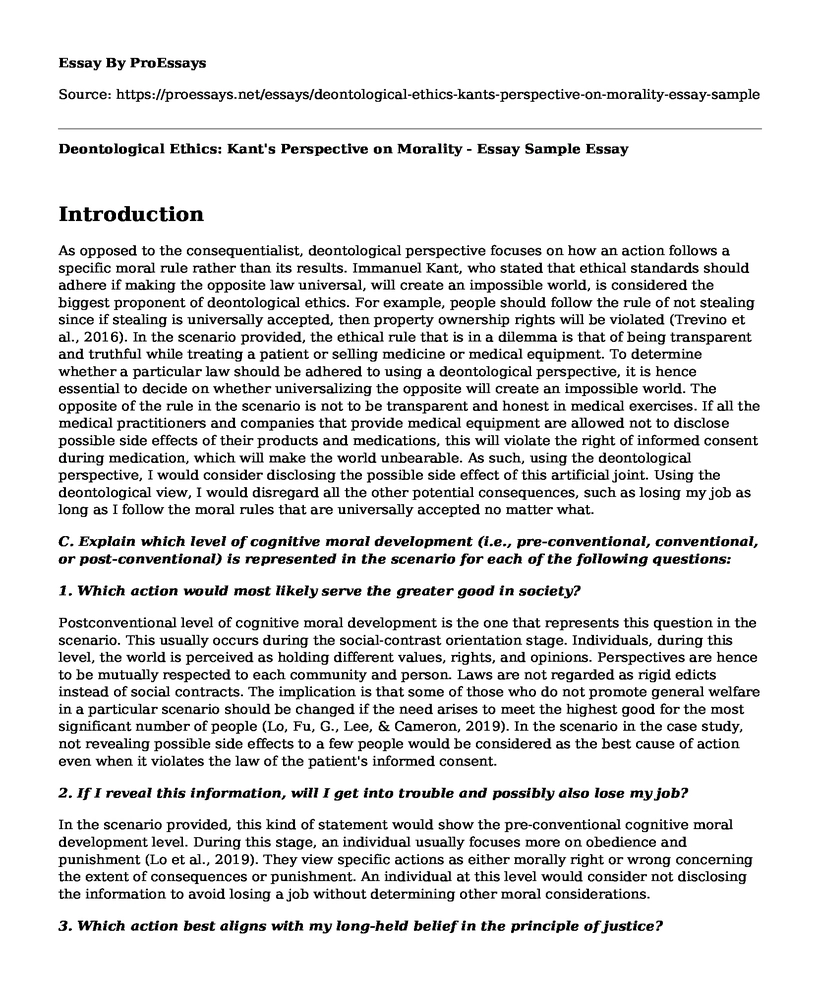Introduction
As opposed to the consequentialist, deontological perspective focuses on how an action follows a specific moral rule rather than its results. Immanuel Kant, who stated that ethical standards should adhere if making the opposite law universal, will create an impossible world, is considered the biggest proponent of deontological ethics. For example, people should follow the rule of not stealing since if stealing is universally accepted, then property ownership rights will be violated (Trevino et al., 2016). In the scenario provided, the ethical rule that is in a dilemma is that of being transparent and truthful while treating a patient or selling medicine or medical equipment. To determine whether a particular law should be adhered to using a deontological perspective, it is hence essential to decide on whether universalizing the opposite will create an impossible world. The opposite of the rule in the scenario is not to be transparent and honest in medical exercises. If all the medical practitioners and companies that provide medical equipment are allowed not to disclose possible side effects of their products and medications, this will violate the right of informed consent during medication, which will make the world unbearable. As such, using the deontological perspective, I would consider disclosing the possible side effect of this artificial joint. Using the deontological view, I would disregard all the other potential consequences, such as losing my job as long as I follow the moral rules that are universally accepted no matter what.
C. Explain which level of cognitive moral development (i.e., pre-conventional, conventional, or post-conventional) is represented in the scenario for each of the following questions:
1. Which action would most likely serve the greater good in society?
Postconventional level of cognitive moral development is the one that represents this question in the scenario. This usually occurs during the social-contrast orientation stage. Individuals, during this level, the world is perceived as holding different values, rights, and opinions. Perspectives are hence to be mutually respected to each community and person. Laws are not regarded as rigid edicts instead of social contracts. The implication is that some of those who do not promote general welfare in a particular scenario should be changed if the need arises to meet the highest good for the most significant number of people (Lo, Fu, G., Lee, & Cameron, 2019). In the scenario in the case study, not revealing possible side effects to a few people would be considered as the best cause of action even when it violates the law of the patient's informed consent.
2. If I reveal this information, will I get into trouble and possibly also lose my job?
In the scenario provided, this kind of statement would show the pre-conventional cognitive moral development level. During this stage, an individual usually focuses more on obedience and punishment (Lo et al., 2019). They view specific actions as either morally right or wrong concerning the extent of consequences or punishment. An individual at this level would consider not disclosing the information to avoid losing a job without determining other moral considerations.
3. Which action best aligns with my long-held belief in the principle of justice?
In the scenario, this statement represents a post-conventional level of ethical, moral development. During this level, the chosen principle focusses on ideas such as respect, dignity, and equality. In this level, laws are valid only if they are grounded in justice, and hence any policy that violates justice is to be disobeyed. Individuals will act in a specific manner because it is just but not because he/she avoid punishment (Lo et al., 2019). Applying this level in the scenario, an individual would consider disclosing the information to the patient as the best consideration and do it violating the agreement, he/she had made with the company and without being worried about being fired.
4. What do the laws say, and what would a law-abiding citizen do?
This question would show a conventional level of cognitive, ethical development. During this level, people accept conventions and rules because of their role in maintaining a functional society. Provisions are deemed as being the same for everyone, and obeying the law is perceived as vital and valuable (Lo et al., 2019). In the scenario, the law says that a patient should be given informed consent of their treatment. As such, a person in this stage would consider disclosing the information just to avoid breaking the law.
5. If I keep quiet, will I get some sort of reward?
This kind of statement will occur during the conventional level of cognitive, ethical development. During this stage, individuals will seek the approval of the others. As such, they will avoid any act that would result in disapproval. Emphasis is usually on being kind to others (Lo et al., 2019). Considering the scenario in the case study, an individual would opt not to disclose information that they agreed not to with the...
Cite this page
Deontological Ethics: Kant's Perspective on Morality - Essay Sample. (2023, Apr 28). Retrieved from https://proessays.net/essays/deontological-ethics-kants-perspective-on-morality-essay-sample
If you are the original author of this essay and no longer wish to have it published on the ProEssays website, please click below to request its removal:
- Essay Sample on Dissociative Identity Disorder
- Essay on Morality: Drug Legalization versus Drug Prohibition of Hard Drugs
- Morality and Good Life Based on the Philosophies of Kant, Aristotle, and Plato
- Applying Ethical Principles in the Field of Health Care Case Study
- Introduction About Business Policy and Ethics - Essay Sample
- Deontological Ethics: Kant's Perspective on Morality - Essay Sample
- Revolutionary Ideas of Rene Descartes: Reforming Philosophy - Essay Example







